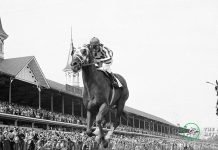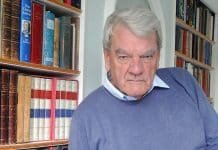Winter chill triggers veteran’s memory of Battle of the Bulge
Bob Bare was captured, spent rest of WWII a POW of Nazis
By Tom Stafford, Springfield News
SPRINGFIELD — Snow and cold are one matter. “But when you get the sleet and ice,” said Bob Bare, “you start thinking about things.”
Many of the memories Bare spoke of on a recent bright and sunny winter day in his Springfield home involved the best working years of his life — time spent with Howard Noonan in the family atmosphere of the Kissell Co. as it existed when Bare arrived in Springfield in 1958.

The 86-year-old spoke, too, with warmth about Earl Morris and Honor Flight, his own trip to the World War II Memorial in Washington, D.C., and the “very humbling” feeling of being “stopped dead in your tracks” upon the realization that people are standing there “recognizing you for who you are and what you have done.”
But the sleet and ice that coated Springfield recently took him back to St. Vith on the German-Belgian border and December 1944, when he was Pfc. Robert Bare, assistant clerk of Company B of the 422nd Battalion of the 106th Army Infantry.
His own bottom line from that time is simple: “We survived, OK? And a lot of guys didn’t.”
A quiet winter
Drawn out of an aviation program discontinued as the Allies established clear air superiority over Europe, Bare became one of the replacement troops to take up position that December — troops that assumed the cold would be their greatest immediate enemy.
“We went into the line about Dec. 10,” he said. “They really felt it was going to be quiet all winter, so we were very much spread out.”
The expectation was that they’d have time to organize during the cold weather, close ranks and be ready for action when the weather warmed. The German army — had other plans.
“We were buried in snow up in the Ardennes Forest, and a couple of days before the actual battle began, we were hearing activity at night. Our scouts could tell things were going on.”
Covered with snow and hunkered down in dugouts on the Siegfried line (a German defensive position built during World War I), they had no notion they were about to become part of one of the biggest battles of World War II.
“About 5:30 in the morning Dec. 15 the activity started,” Bare said. “And on Dec. 16, we were very much hammered. Our company commander was killed in that action.
“On the 17th, we were entirely cut off.”
Surrounded, they attempted to escape, but failed. By Dec. 19, Bare said, “that was the end of that.”
Bob Bare’s part of the Battle of the Bulge was over, and his life as a prisoner of war had just begun.
Staying alive
“When we were first captured, we were marching in the snow, didn’t have the right clothing and were just trying to survive,” Bare recalled.
That set him and his companions apart from 113 men taken prisoner in nearby Malmedy, then shot to death en mass by German soldiers.
Cold and wet, the POWs marched through the mud and snow to Koblenz, Germany, on the Rhine, taking shelter Dec. 28 in three buildings of a former German army officer training complex.
That night, two of those buildings — and the men in them — were destroyed by American bombers. Just as he could easily have been in the ill-fated unit at Malmedy, “I could just as easily have been in one of those other buildings,” Bare said. Or his end could have been announced by a single report from a rifle.
Early on, “I was pretty sure they were going to wipe us out,” Bare said. “And as we would move from place to place, you’d think, ‘This is probably as far as I go.’ ”
Instead, he went on to Stalag 12A in Limburg, taking cover Dec. 30 in bare-bone barracks that had stoves but no fuel to burn in them.
If missing firewood, the barracks were well stocked with cold, hungry men who for company had a companion common to their conditions: disease. “From Jan. 10-22, the camp was quarantined for diphtheria,” Bare said. It was a trying existence.
“Not knowing what the hell was going to happen to you, the regimentation in the camp — you were constantly under observation — your clothing was worn out. It was just a raw barracks kind of existence.” Trapped and hungry, the soldiers’ favorite topic was food: what they would eat and where they would eat it when they were released.
Bare’s contribution was the memory of Smith’s Cafeteria in downtown Toledo, which would come to mind as he gnawed on black bread all speculated contained a special ingredient: sawdust. “In truth, the German people didn’t have that much to eat, either,” Bare said.
Breaking rocks
“On Jan. 31, they put us on a train to Stalag 4B in Muhlburg, Germany,” he said. “The train trip was kind of interesting.” There were “absolutely no provisions” in the boxcars save “maybe a little straw on the floor.”
Stalag 4B was a camp mostly of British noncommissioned soldiers, among whom Bare didn’t spend much time. Shortly after his arrival, “about 20 of us were moved by train … on a work party. It turned out to be a stone quarry.”
With many of their runwas in ruins, the German Luftwaffe needed rock tomake reaipas. The work detail’s assignment was simple, said Bare: “breaking big rocks into small rocks.” In one way, it was ideal work for men whose focus was on the here and now. But with sledge hammers as their only tools, “by early to mid-March, hardly anybody was able to work any more,” Bare said. His own weight, normally 150 pounds back then, was hovering just over 100, and “one day, I think I passed out on the way back to the barracks.” By their their arrival at Oschatz, Germany, in April of 1945, Bare said, “we were totally debilitated, physically, by the lack of food and what we were being asked to do.”
Freedom
Their German captors had worries of their own. The dreaded Russian army had reached the Elbe River and was pushing nearer. Trying to escape Stalin’s forces, the gruards “started to move us, and then they left us,” Bare said. When the German soldiers disappeared, “We were just there all by ourselves,” he said. “We kept going, a small group of about 15.”
They didn’t know where they were going — they just kept going. Near Wurtzen, Germany, they ran into American troops, who began to take care of them. Flown back to Reims, his contingent settled for a time at Camp Lucky Strike in France and eventually boarded a Navy ship and arrived in the United States the latter part of May 1945.
“I (spent) … most of that summer kind of recovering and regaining strength,” Bare said.
A lesson learned
It was just the chance formation of words in the mind that caused Bare to describe his years following the war in a striking way: “My after life has been very good.”
For the man raised in Tiffin, that life included finishing his education at Bowling Green State University, there meeting his wife of now more than 60 years, and —following an interview with Dick Hudson — beginning an enjoyable, fulfilling career in finance and banking in Springfield.
Since retiring for a second time in 1989, Bare has remained active. He still volunteers and is going back on the board of the Clark County Historical Society. He also has remained active in TAC Industries, which provides employment for developmentally disabled adults.
He’s also a guy who — when the winter deepens as it has recently — tends to hunker down. “I have to be a little careful in how much cold I get,” Bare said. “I kind of stay away from it.” It’s a little something he learned a few winters back.
Contact this reporter at (937) 328-0368.
View Original Article
ATTENTION READERS
We See The World From All Sides and Want YOU To Be Fully InformedIn fact, intentional disinformation is a disgraceful scourge in media today. So to assuage any possible errant incorrect information posted herein, we strongly encourage you to seek corroboration from other non-VT sources before forming an educated opinion.
About VT - Policies & Disclosures - Comment Policy



